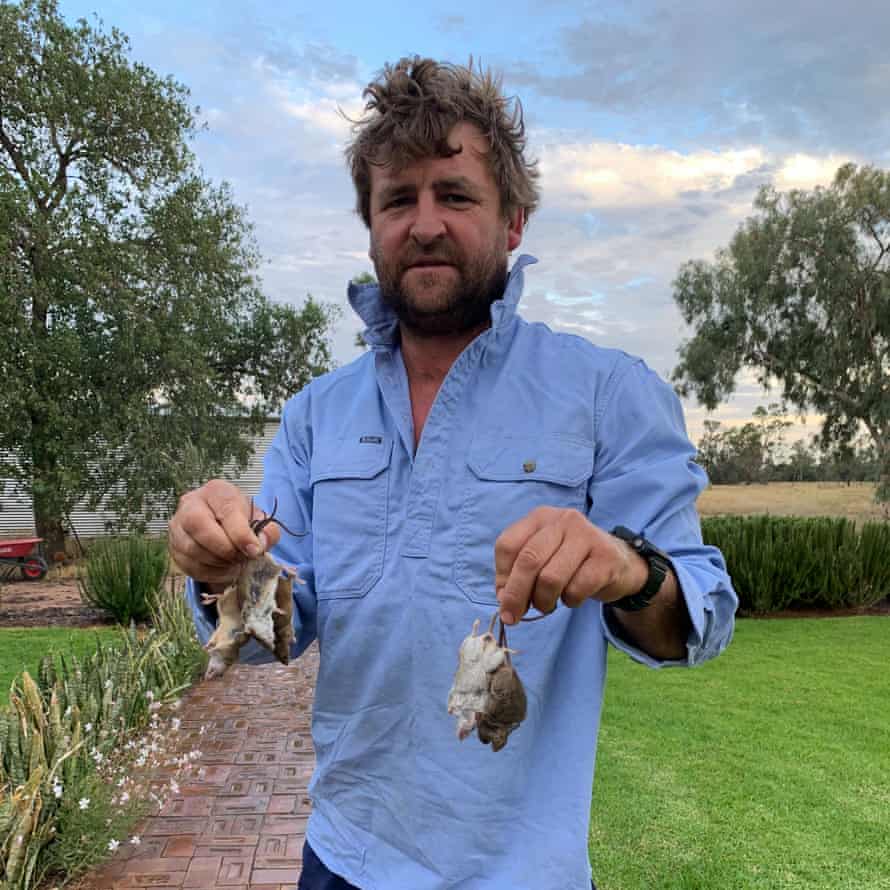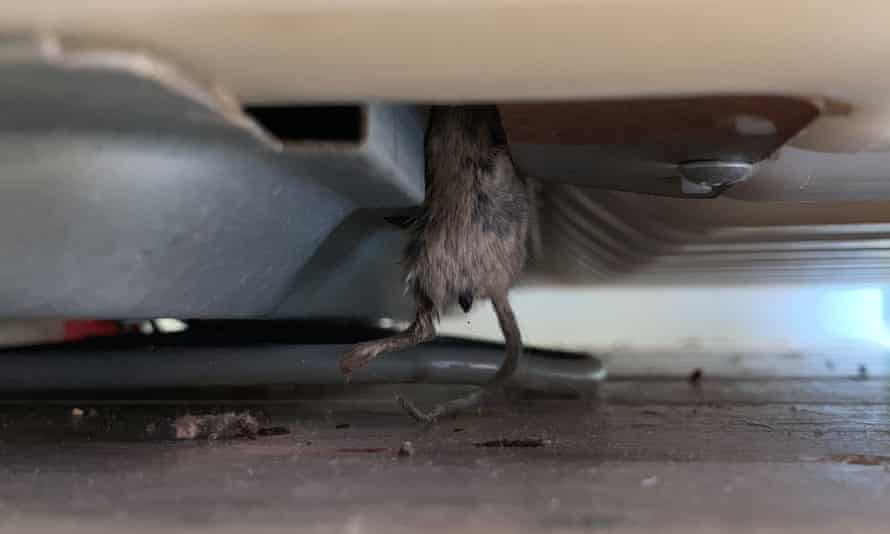‘You can’t escape the smell’: mouse plague grows to biblical proportions across
Drought, fire, the Covid-19 pestilence and an all-consuming plague of mice. Rural New South Wales has faced just about every biblical challenge nature has to offer in the last few years, but now it is praying for another – an almighty flood to drown the mice in their burrows and cleanse the blighted land of the rodents. Or some very heavy rain, at least.
It seems everyone in the rural towns of north-west NSW and southern Queensland has their own mouse war story. In posts online, they detail waking up to mouse droppings on their pillows or watching the ground move at night as hundreds of thousands of rodents flee from torchlight beams.
Lisa Gore from Toowoomba told Guardian Australia her friend stripped the fabric of her armchair when it began to smell, only to find a nest of baby mice in the stuffing.
Dubbo resident Karen Fox walked out of the shower on Friday morning to see a mouse staring at her from the ceiling vent. There’s nothing she can do, she says, because the stores are sold out of traps.
In Gulargambone, north of Dubbo, Naav Singh arrives five hours early for work at the 5Star supermarket to clean up after the uninvited vermin visitors.
“We don’t want to go inside in the morning sometimes. It stinks, they will die and it’s impossible to find all the bodies … Some nights we are catching over 400 or 500,” he says.
Before opening, Singh must empty the store’s 17 traps, sweep up the droppings and throw out any products the mice have attacked.
“We have got five or six bins every week just filled with groceries that we are throwing out,” he says.
The family-run business has had to drastically reduce stock, put whatever they can in thick containers, use empty fridges to store the rest. Nothing in the store is safe, with mice even chewing their way into plastic soft drink bottles. “They were running around faster after that,” Singh jokes.
After years of drought, rural NSW and parts of Queensland enjoyed a bumper crop due to the recent wet season. But this influx of new produce and grains has led to an explosion in the mouse population. Locals say they started noticing the swarms up north in October and the wave of rodents has been spreading south ever since, growing to biblical proportions.
Singh estimates that the plague has so far cost the business upwards of $30,000, and is unsure how much longer they can continue.
“It’s been going on for three months. It’s going to be really hard, we have lost so many customers,” he says.
Locals say the plague has affected people’s daily life so much the usual conversation starter has changed from a comment on the weather to comparing how many mice they caught the previous night.
Pip Goldsmith in Coonamble knew she would have to set traps in her home and fields when the mice started descending, but had no idea she would also need to do the same in her car.
“I realised there had been a packet of seed biscuits that had fallen out of a shopping bag in the back seat … the mice had chewed through the box and eaten every single seed. There was nothing left,” she says.

“That night I set six traps and just kept checking them. I think I caught nearly 20 mice before midnight.”
The tally from Goldsmith’s car alone is now at more than 100, and she thinks the total trapped at her home would be in the thousands.
“They stink whether they are alive or dead, you can’t escape the smell sometimes … it’s oppressive, but we are resilient.”
The plague has given rise to a new form of morbid family bonding, with kids enlisted as frontline soldiers in the rodent fight.
“I’ve got a four- and a five-year-old, we have great fun engineering our traps with buckets and wine bottles … they’ve got very quick at catching and disposing of mice. It makes you proud and squeamish at the same time,” Goldsmith says.

Gore in Queensland says her 12-year-old son has taken on the role of chief anti-vermin soldier of the house.
“He goes out at 6pm and sets the traps, and then he’d come in for about an hour and then he’d go out and empty and set them again, and just keep doing that four or five times,” she says.
“The record is 183 in a night … It’s like his job at the moment. He is very proud of himself,” she says.
Lucy Moss, the owner of the Mink and Me cafe in Coonamble, says she has had to pay to have her fridge fixed seven times after the corpses of dead mice clogged up the machinery.
“The mice get into the fan at the bottom and have a great old time and then the fan turns on and they can’t get out,” she says.
This alone has cost her thousands.
Mice have ruined a shed full of hay on Moss’s farm that she was saving in case of another drought.
“They move into the hay and are…
Read More: ‘You can’t escape the smell’: mouse plague grows to biblical proportions across

